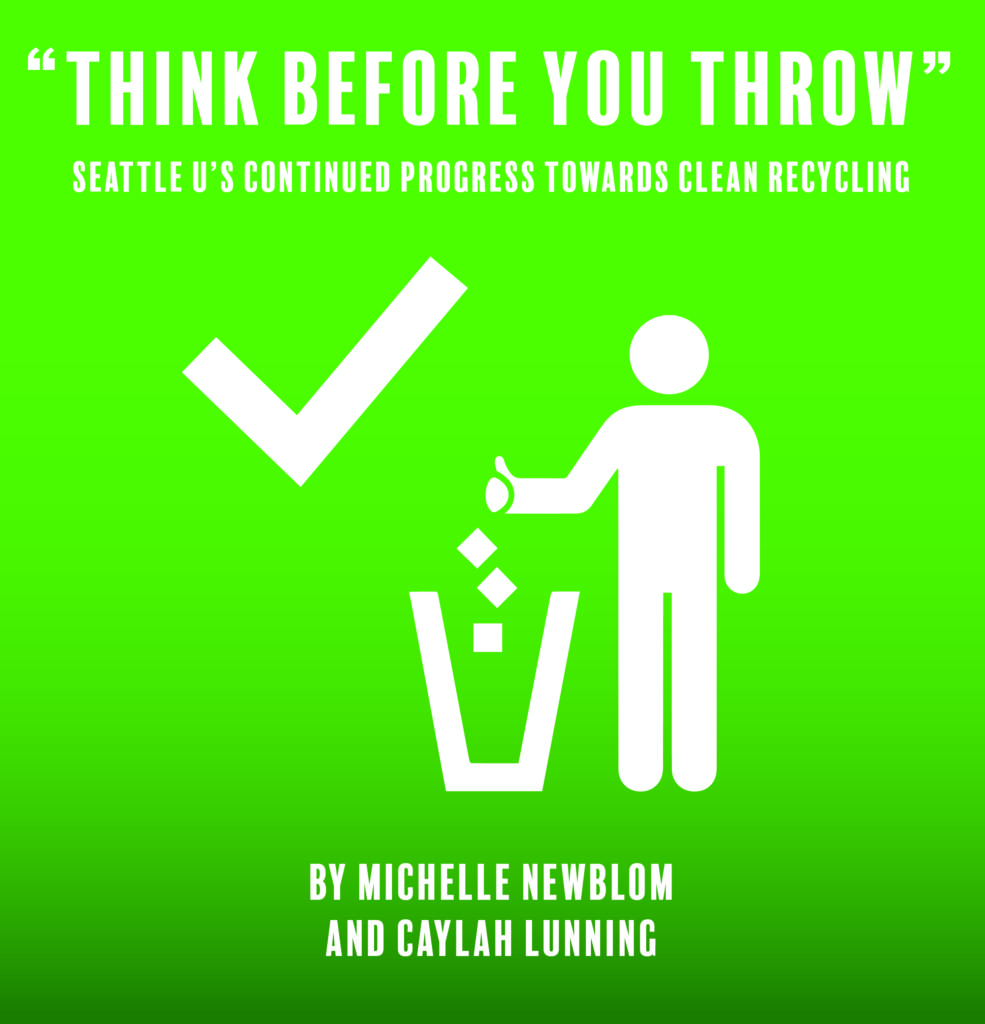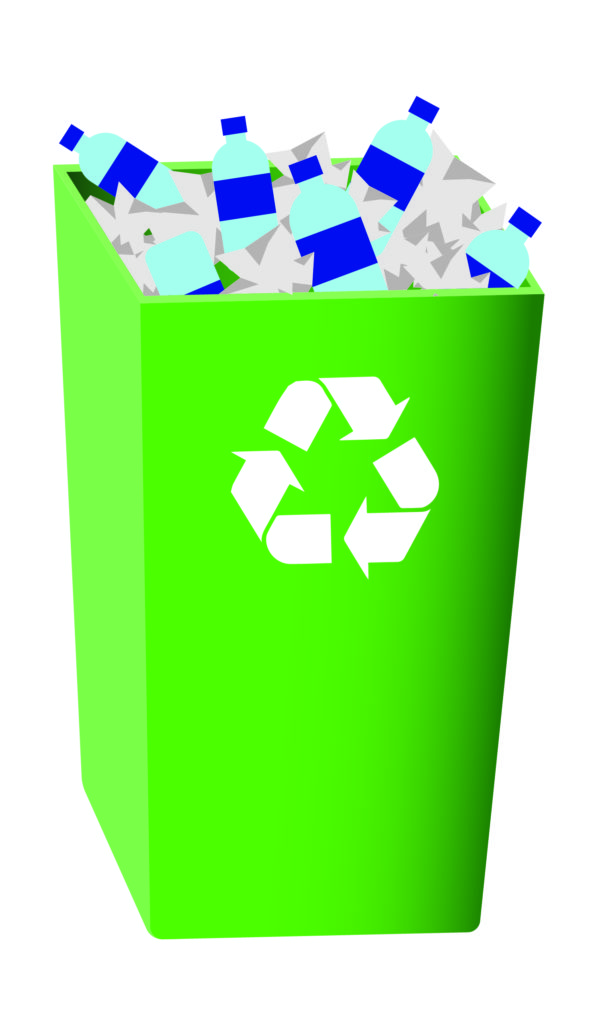“Think Before You Throw”: Seattle Us’s Continued Progress Towards Clean Recycling
Michelle Newblom co-wrote this article.
After failing a campus-wide recycling audit, Seattle University sent out a mass email on Feb. 7 explaining the severity of the issue and the financial and environmental impacts it would have on the community. The university was given 30 days to clean up its recycling practices—sparking concern among students, staff, and faculty who have in turn improved their recycling habits and lowered overall contamination levels.
The university’s main compactor, which accounts for resident halls and garbage bins around campus, was audited again after the 30 day period and Recology stated that the results came back positive: less than 10 percent of the recycling was contaminated.
Recology collects recycled materials from institutions such as Seattle U and compacts recycling to sell to to vendors that process the materials. If the recycling is contaminated too much, it cannot be processed.
Yolanda Cieters, Sustainability Manager for the Center of Environmental Justice and Sustainability , was impressed with the community’s’ dedication to cleaning up the recycling bins, but emphasized that the campus needs to continue to keep making strides.
“It was remarkable how we were able, in just a month, to reduce from 10 percent contamination to much less than that. We got some very positive feedback on that from Recology,” she said. “But, we cannot stop here.”
Recology conducted an audit of the Student Center compactor on Feb. 28 and showed less promising results as over 10 percent of the recycling was contaminated. Due to this, the Student Center’s recycling will be sent directly to landfill at a greater cost. Contaminants that were found in the Recology audit included soiled paper, wax cardboard, food waste, liquids/ saturation, latex gloves, packaged food, and textiles/fabrics.
Manager of Resource and Conservation and Facilities Operations Richard Moyer highlighted the quick turnaround cleaning up the campus- wide compactor, but noted why the Student Center recycling was still having issues.
“That’s really huge, to be able to turn around in 30 days and have really dirty recycling and then really clean recycling is phenomenal,” Moyer said. “It’s just the continued problem at the Student Center is people keep putting food and liquids in the recycling. That’s where you’re eating, that’s where you’re drinking, so obviously you’re going to have a harder time at that location.”
Among other groups and organizations on campus, Seattle U’s food-provider Chartwells has been taking specific measures to improve the recycling quality at the Student Center compactor. Shelley Strayer, resident district manager for Chartwells, has been working with Chartwells employees to clean up contamination on their end by training staff and sorting through their waste themselves.
“Our biggest focus right now is to separate the waste stream inside the kitchen area first and then we can ensure that it goes out properly,” Strayer said. “We also do trainings where we’re emptying out garbage cans in the kitchen itself, sort of in a controlled environment of course, and then we educate and go through and say ‘look, this got put into this can and it should’ve been in the recycling can.’” Moyer noted the tendency to use to- go materials rather than reusable ones at Cherry Street Market is not helping the problem either.
“We’re also trying to push the use of reusable items in the cafeteria, so a lot of people take to-go boxes and then go ‘man where does this go, recycling or compost?’” he said. “Please use the reusable items because that’s even better than recycling or composting.”
Even with the one failed audit, the campus has seen an increase in awareness among the student population.
Hannah Marie Lucero, a junior environmental studies major with a focus on urban sustainability, is vice president of the Green Team and has seen an increase in participation among the student body and is proud of how the campus has taken the issue seriously.
“Just looking at the sign-up sheets, there’s been a lot of slots being filled, and that’s a good turn out,” Lucero said. “There has been better outreach and a lot more students being engaged. There’s way more people from outside the Green Team that are signing up.”
Increasing awareness and education is a focal point for Recycling Coordinator and Compost Technician Nathan Wolk, who is thankful for the community’s continued involvement.
“Going forward there is a strong push for education, a lot more messaging as well about our current status and where we’re going from there,” Wolk said. “Everyone’s doing a great job and being responsive and realizing this is a large issue that’s affecting everyone on campus here. We do have work to do, but it’s going in a good direction.”
The concern of contaminated recycling has not been as prominent of an issue in recent years at Seattle U. While it is promising that the campus is taking strides to combat the problem, the fact it was a problem in the first place is something some individuals took note of.
Recycling Assistant Brandon McWilliams is a sophomore creative writing and environmental studies double major who said that Seattle U’s diversion rate is much worse than it has been in recent years.
“The fact that we got the large compactor down in contamination levels is great. That means that people are trying and are paying attention, but the fact that even happened means that there is a lot of work to do,” McWilliams said. “We’ve been doing our audits and we’re 15-20 percent worse on our diversion rate compared to last year, so we definitely as a campus have a lot of room to improve, but we can definitely put in the effort when needed.”
Lucero also noted how the quick turnaround in cleanup highlights how we could have solved the problem before it came to fruition.
“I feel like that just shows there’s not a big issue behind recycling and composting, it’s just the fact that we’re kind of being lazy, or we got used to being in that ‘oh we’re so green’ mindset that we can just lay back,” Lucero said. “But it shows you have to be consistent with the practices you do, and we can’t just assume that everybody knows how to recycle or compost.”
While Seattle U has received national recognition for being eco- friendly, April Atwood, Green Team club advisor and marketing professor commented on how this recent contamination issue seemed to dismantle that notion.
“Seattle University prides itself on being green, but obviously from the data that we’ve been seeing, we’re not as green as we thought we were,” Atwood said. “Seattle U has won some awards, they were ranked really high on the national list for green schools last year. Those types of rankings are ironic because we were ranked eighth in the nation, and we’re having our recycling rejected by our recycling company because it’s too contaminated.”
While there has been a lot of attention surrounding the audits and the 30-day time frame, there will still be future audits and it is important that the community maintain good habits even without as much attention. Cieters stresses the importance of keeping up good recycling practices even when the university is not focusing on the matter as much as it has been recently.
“I’m concerned about the next weeks and months because it has proven that when there is less outreach around these type of matters that then practices will also sometimes regress,” she said. “That’s something we really want to avoid and keep this just as one of the many other things on top of the minds of people on this campus.”
Overall, the community has been quick to combat the problem. With an increase of awareness on social media, new informational signage being drawn up, more outreach activities being conducted, and an emphasis on Recyclemania, the university is working to clean up the Student Center compactor as well as continue to keep the main compactor clean.
Wolk commended the efforts of the community and hoped to see participation keep increasing in the months to come.
“It’s been a great group effort from everyone on campus, with all the messaging that’s been going out a lot of really just cooperation and collaboration between various departments and the student body and everyone. Just please think before you throw.”
The editor may be reached at
editor@su-spectator.com



